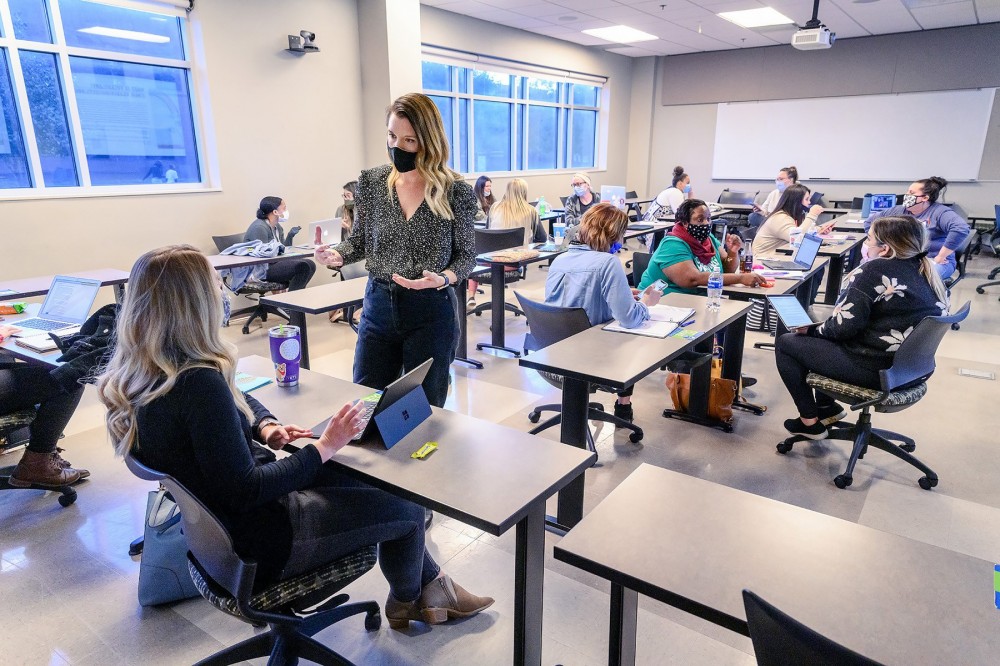MURFREESBORO, Tenn. — The National Council on Teacher Quality recently recognized MTSU’s Department of Elementary and Special Education with an A+ distinction for using the most effective, research-based methods of reading instruction.
“We left no doubt that we are doing the highest quality reading instruction,” said Eric Oslund, chair of the department. “We’ve redesigned our literacy courses to align them with the top research practices and policy so that we offer the most effective and research-based instruction in teaching students how to read.
“We know our faculty in the College of Education and the students we prepare are difference makers, and this accomplishment highlights the difference we are making for our education students and the pre-K-12 students they will teach when they graduate from MTSU.”
The National Council on Teacher Quality, or NCTQ, assesses teacher preparation programs to support its mission of ensuring every child has effective teachers and that every teacher has the opportunity to be effective, according to its website.
To determine distinctions for the literacy curriculum of teacher preparation programs across the U.S., NCTQ experts evaluated literacy course lecture topics, reading materials, assignments, exams and more, stated its release. MTSU’s program was one of only 48 that earned an A+ for its literacy curriculum and one of only two institutions in the state to do so.
“The Middle Tennessee State University program serves as a proof point,” said Heather Peske, NCTQ president. “Other teacher preparation leaders and faculty across the country must take note. There are programs that are doing this right, ensuring that their elementary teacher candidates get the preparation in how to teach reading that they both want and deserve.”
University President Sidney A. McPhee applauded the department’s work on a critical area of instruction for educators.
“Our College of Education continues to provide superior instruction to our student teachers, and this national recognition confirms the great work of our dedicated faculty and staff,” said McPhee. “Our teachers go into K-12 classrooms all over our state, nation and world with the necessary training to greatly improve the lives of the students under their care.”
University Provost Mark Byrnes said he is very proud of the education faculty and staff for this national recognition.
“It confirms that we are maintaining our tradition of preparing students to be outstanding teachers,” Byrnes said. “Producing excellent teachers is vital for our state and remains one of the top goals of MTSU.”
Oslund said that according to data from the National Assessment of Educational Progress, 70% of fourth graders in Tennessee read at a basic or below basic level for their grade and that this population grows to 72% by eighth grade.
To best prepare MTSU-trained educators to combat this trend, literacy faculty teamed up to update and expand the department’s Reading Methods course into two sequential courses that will launch this fall.
The team of literacy faculty — Katie Schrodt, Janna McClain, Joan Boulware, Sungyoon Lee, Katherine Mangione, Bonnie Barksdale and Alicia Pence — also compiled the evidence of the department’s literacy curriculum that Oslund included in his submission to the NCTQ.
“The core of this distinction comes from the faculty,” Oslund said. “The work they are doing is very high quality, research-based and effective.”
Oslund highlighted that literacy impacts students both inside and outside of the classroom.
“Reading is not just a skill used in English class,” he said. “It’s part of every subject area. It has lifelong implications. Evidence shows if students can’t read proficiently in fourth grade, they likely won’t in eighth or 12th, which means college opportunities are very limited or nonexistent and that creates, widens and enforces disparities. One of most effective ways to treat that is to make sure every student receives high quality reading instruction from the start.”
The department has even broadened its focus on literacy with literacy night events held at local elementary schools that put books into the hands of students and families.
“All of our faculty have been, at one time or another, classroom teachers themselves,” Oslund said. “They are very passionate about helping students learn and that passion goes beyond our job of being professors and extends into making a direct impact on our community….
“We want to change students’ lives for the better in any way we can, whether that’s preparing future teachers, working with the local community, or working with the national and international community through research dissemination. We’re trying to help people meet their full potential and increase opportunity and access and eliminate disparities.”
To learn more about the opportunities and events at the Department of Elementary and Special Education, visit the website at https://www.mtsu.edu/elementary/. To learn more about the opportunities at the College of Education, visit the website at https://www.mtsu.edu/education/ or Facebook page at https://www.facebook.com/MTSUEducation/.





